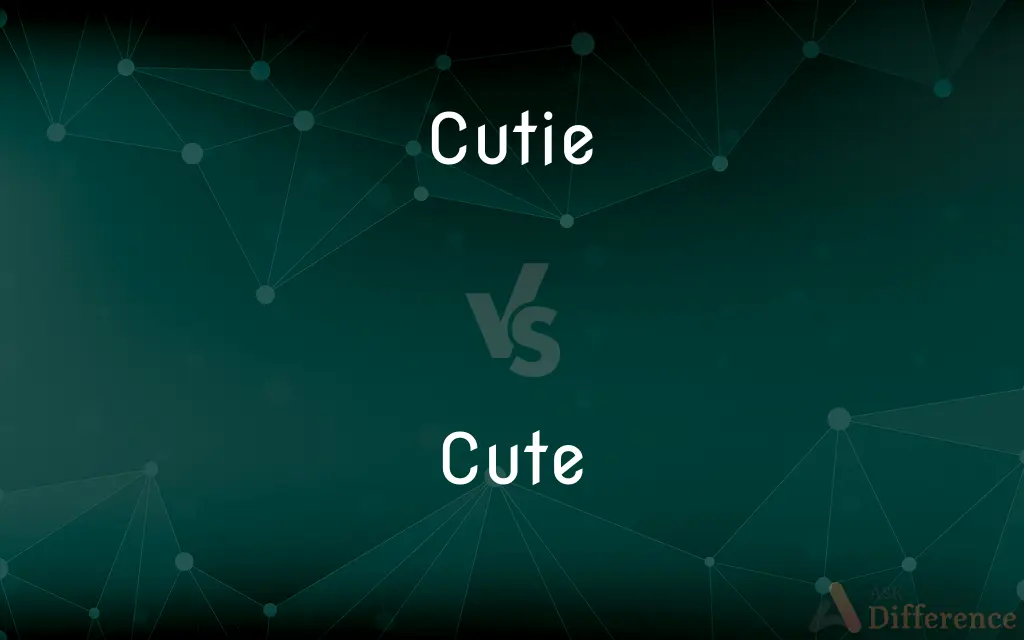Cutie vs. Cute — What's the Difference?
By Tayyaba Rehman & Urooj Arif — Updated on March 4, 2024
"Cutie" is a noun referring to someone attractive or endearing, while "cute" is an adjective describing something or someone as charming or adorable.

Difference Between Cutie and Cute
Table of Contents
ADVERTISEMENT
Key Differences
The word "cutie" serves as a noun, often used in informal contexts to describe a person, usually implying they possess a charming, attractive, or endearing quality. It's a term of affection, suggesting more than just physical attractiveness; it conveys a sense of warmth and appeal to the personality as well. For example, calling a child or a romantic partner a "cutie" denotes affection and fondness. On the other hand, "cute" is an adjective and has a broader application. It can describe not only people but also animals, objects, and even situations that exhibit qualities of charm, attractiveness, or adorableness. When something is described as "cute," it evokes a pleasant and appealing sensation, often associated with smallness, beauty, or a touch of humor and wit. "Cute" can also imply a level of cleverness or ingenuity, as in a "cute idea."
The use of "cutie" is more personal and direct, typically used in direct address or when talking about specific individuals. "Cute," however, can qualify a wider range of subjects and is used to express a general sense of appeal and attractiveness that can be visual, emotional, or intellectual.
"Cutie" and "cute" occupy slightly different spaces. "Cutie" is more colloquial and can be seen as more endearing or intimate, while "cute" is universally understood and used in both casual and formal contexts to describe something pleasing in a wholesome, attractive manner.
The choice between "cutie" and "cute" depends on the context and the relationship between the speaker and the subject. While both convey a sense of affection and admiration, "cutie" is more personal and specific, whereas "cute" is versatile and widely applicable.
Comparison Chart
Part of Speech
Noun
Adjective
ADVERTISEMENT
Usage Context
Informal, personal
Broad, both informal and formal contexts
Applies To
People, especially in terms of affection
People, animals, objects, ideas
Connotation
Endearing, attractive personality or appearance
Charming, adorable, sometimes clever
Typical Use
Direct address or specific individuals
Describing qualities of a wide range of subjects
Compare with Definitions
Cutie
Used to describe someone attractive or adorable.
My niece is such a cutie with her big smile.
Cute
Describing something charming or endearing.
What a cute puppy!
Cutie
A term of endearment for someone charming.
Look at that little cutie playing in the park.
Cute
Can apply to cleverness or wit.
That was a cute remark.
Cutie
Sometimes used to express admiration without direct familiarity.
Did you see the new guy? He's a cutie.
Cute
Often used for things small and appealing.
Look at those cute little shoes.
Cutie
Often implies a warm, appealing personality.
He's not just handsome; he's a real cutie.
Cute
Versatile in describing agreeable qualities.
They came up with a cute idea for the project.
Cutie
Can signify closeness or affection in relationships.
Good morning, cutie,
Cute
Implies attractiveness combined with innocence.
She has such a cute smile.
Cutie
An attractive or endearing person, especially a young woman
A sandy-haired cutie
Cute
Attractive in a pretty or endearing way
She had a cute little nose
Cutie
A cute person.
Cute
Attractive or pretty in a youthful or dainty way
A cute puppy.
A child wearing a cute outfit.
Cutie
A cute person or animal.
Common Curiosities
Can "cute" be used in a professional context?
While "cute" can be used in professional settings, its application should be carefully considered to maintain professionalism, especially when describing ideas or objects rather than people.
Does "cutie" imply a deeper affection than "cute"?
"Cutie" is often more personal and may imply a closer relationship or deeper affection, given its use as a term of endearment.
How do I choose between using "cutie" and "cute"?
Choose "cutie" when referring to a person with whom you have a personal or affectionate relationship. Opt for "cute" when describing general qualities of attractiveness, charm, or cleverness across a broader range of subjects.
Can "cute" have a negative connotation?
In some contexts, describing something as "cute" might be seen as belittling or minimizing, especially if it undermines the seriousness or complexity of an idea or situation.
Is "cutie" always used for people?
Primarily, yes. "Cutie" is mostly used to describe people, particularly in a way that emphasizes their attractiveness or endearing qualities.
Can "cutie" be used for ?
Yes, "cutie" can be used, often in a romantic or flirtatious context, but always with consideration for the relationship and setting.
Is it appropriate to call a colleague "cutie"?
Generally, it's best to avoid using terms like "cutie" in the workplace to maintain professionalism and respect boundaries.
Can objects or animals be described as "cutie"?
Typically, "cutie" is reserved for people, while "cute" is more appropriate for describing objects or animals.
Are there cultural differences in the use of "cutie" and "cute"?
Yes, perceptions and usage can vary by culture, with some places finding "cutie" more universally acceptable and others seeing it as more intimate or reserved for specific relationships.
How do these words fit into language evolution?
Both "cutie" and "cute" reflect the language's adaptability, with "cute" evolving from "acute" to its current usage, and "cutie" emerging as a diminutive form, showcasing the dynamic nature of English.
Share Your Discovery

Previous Comparison
Wild vs. Untamed
Next Comparison
Pikelet vs. CrumpetAuthor Spotlight
Written by
Tayyaba RehmanTayyaba Rehman is a distinguished writer, currently serving as a primary contributor to askdifference.com. As a researcher in semantics and etymology, Tayyaba's passion for the complexity of languages and their distinctions has found a perfect home on the platform. Tayyaba delves into the intricacies of language, distinguishing between commonly confused words and phrases, thereby providing clarity for readers worldwide.
Co-written by
Urooj ArifUrooj is a skilled content writer at Ask Difference, known for her exceptional ability to simplify complex topics into engaging and informative content. With a passion for research and a flair for clear, concise writing, she consistently delivers articles that resonate with our diverse audience.















































